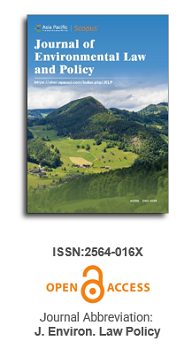
Asia Pacific Academy of Science Pte. Ltd. (APACSCI) specializes in international journal publishing. APACSCI adopts the open access publishing model and provides an important communication bridge for academic groups whose interest fields include engineering, technology, medicine, computer, mathematics, agriculture and forestry, and environment.
Issue release: 30 June 2025
This study develops a synthetic sustainability indicator (SSI) to assess corporate sustainability performance using data from Spanish IBEX 35 companies. Utilizing sparse principal components analysis (sPCA), the study condenses 65 Environmental, Social, and Governance (ESG) variables into a single indicator, addressing the lack of standardization in CSR evaluations and enabling comparisons across companies and sectors. The results show that environmental practices are the most significant factor (37.30%), followed by labor practices (19.23%) and corporate governance (18.52%). The study’s key contribution lies in offering a quantifiable, transparent method for evaluating corporate sustainability. The SSI provides valuable insights for investors and analysts, promoting data-driven decision-making and encouraging corporate improvements in sustainability performance.
Issue release: 30 June 2025
Environmental culture in university students refers to the set of knowledge, values and behaviors that they acquire and practice with the protection of the environment within their academic space, supported by environmental educational policies. We proposed to understand the existence of an inadequate environmental culture in university students. The objective of this study was to analyze university educational policies and environmental culture in Peruvian students, comparing the results according to sociodemographic variables. A total of 2448 intentionally chosen university students participated, a non-experimental cross-sectional design was used, a quantitative approach of comparative descriptive level was used. In addition, in the data analysis, the descriptive results are presented in a table of frequencies and percentages, while the inferential analyses are presented in statistics. A medium level of environmental culture was found at 57.3% with a tendency to be low at 37.3% in university students. In addition, the comparison of sociodemographic variables indicates that there are statistically significant differences (p < 0.05), therefore, the students from public universities, the area of social sciences and the last years of study present higher scores than the other comparison groups. In conclusion, environmental educational policies have not been adequate and applied by universities to generate an adequate environmental culture in university students within the academic field.
Issue release: 30 June 2025
Domestic and foreign countries have different views on soft law governance. In China, the understanding of “soft law” stays at a static level, which is considered to be a social norm in a pluralistic sense. Foreign countries understand “soft law” from a dynamic perspective, that is, they mainly tend to take it as a means of governance and a mechanism to solve disputes and contradictions. Combining the above two viewpoints, soft law governance can be understood as a governance concept or governance model, and it takes the needs of the governance object as the starting point. Moreover, it advocates bottom-up governance. This governance method reflects the value connotation of people-oriented, democratic, autonomous and inclusive, and actively practices “multi-subject participation”. It can be seen that, rather than hard law, soft law is more suitable for the liquidity, development and change characteristics of enterprise data, especially in the context of environmental-related data, and is conducive to condensing the governance force of multiple subjects including the government. The effectiveness of enterprise data compliance governance is of great significance in the field of environmental protection. With the help of ecological environment data such as carbon emission data, environmental detection data and pollution control data, the efficiency and benefit of ecological environment governance can be improved, and the efficiency of ecological governance can be driven by data. But compared with the United States, the European Union and Singapore, the effect of enterprise data compliance soft law governance is not significant. Through literature research and comparative analysis, the factors affecting the effectiveness of Chinese soft law in enterprise data compliance governance are analyzed, and the solutions can be found from the comparative analysis.

University of Lapland, Finland

Yaroslav Mudryi National Law University, Ukraine
-
-
-
Scopus (CiteScore: 0.5)
-
EBSCO
-
HEINONLINE
-
Crossref
-
Publons
-
ROAD
-
WorldCat
-
J-Gate
-
Scilit
-
EuroPub
-
SSRN
-
Index of Copernicus
-
CiteFactor
-
Dimensions
-
DRJI
-
Zenodo
-
TrendMD
-
OpenAIRE
-
-


 Open Access
Open Access